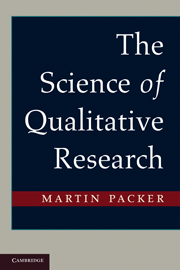Book contents
- Frontmatter
- Contents
- List of Figures and Tables
- List of Boxes
- Acknowledgments
- Introduction
- Part I The Objective Study Of Subjectivity
- Part II Ethnographic Fieldwork – The Focus On Constitution
- Part III Inquiry With An Emancipatory Interest
- 11 Qualitative Research as Critical Inquiry
- 12 Emancipatory Inquiry as Rational Reconstruction
- 13 Social Science as Participant Objectification
- 14 Archaeology, Genealogy, Ethics
- 15 A Historical Ontology of Ourselves
- References
- Name Index
- Subject Index
14 - Archaeology, Genealogy, Ethics
- Frontmatter
- Contents
- List of Figures and Tables
- List of Boxes
- Acknowledgments
- Introduction
- Part I The Objective Study Of Subjectivity
- Part II Ethnographic Fieldwork – The Focus On Constitution
- Part III Inquiry With An Emancipatory Interest
- 11 Qualitative Research as Critical Inquiry
- 12 Emancipatory Inquiry as Rational Reconstruction
- 13 Social Science as Participant Objectification
- 14 Archaeology, Genealogy, Ethics
- 15 A Historical Ontology of Ourselves
- References
- Name Index
- Subject Index
Summary
[The task] consists of not – of no longer – treating discourses as groups of signs (signifying elements referring to contents or representations) but as practices that systematically form the objects of which they speak. Of course, discourses are composed of signs; but what they do is more than use these signs to designate things. It is this more that renders them irreducible to language (langue) and to speech. It is this “more” that we must reveal and describe.
Foucault, 1969/1972, p. 49The third approach to critical inquiry we shall consider is that of Michel Foucault (1926–1984). Foucault developed a form of critical inquiry that explored knowledge, power, and human being itself as products of history and culture. His work throws light on the central aspects that define a form of life, as well as how investigation itself always arises in a form of life. Foucault reversed Kant’s critique: whereas Kant had claimed to show how seemingly contingent aspects of human experience, such as causality, are actually necessary and universal, Foucault aimed to show how apparent necessities are actually contingent. Unlike Habermas, he didn’t view language as a transcendental or quasi-transcendental domain. Unlike Bourdieu, he didn’t view science as a field that produces knowledge that can transcend its circumstances. Indeed, Foucault’s historical critique was directed especially at the “universal truths” of the modern biological, psychological, and social sciences. These turn out, in his analysis, to be outcomes of contingent historical events. But we shall see that Foucault did not consider truth to be indistinguishable from opinion, politics to be merely the play of power, or ethical judgments to be culturally relative. Whereas Habermas focuses on individual know-that, on reflection and decision making, and Bourdieu emphasized know-how, the embodied knowledge of habitus, Foucault recognized both formal knowledge and informal practical know-how and explored the relationship between them, as well as their relation to the acting knower.
- Type
- Chapter
- Information
- The Science of Qualitative Research , pp. 342 - 377Publisher: Cambridge University PressPrint publication year: 2010



